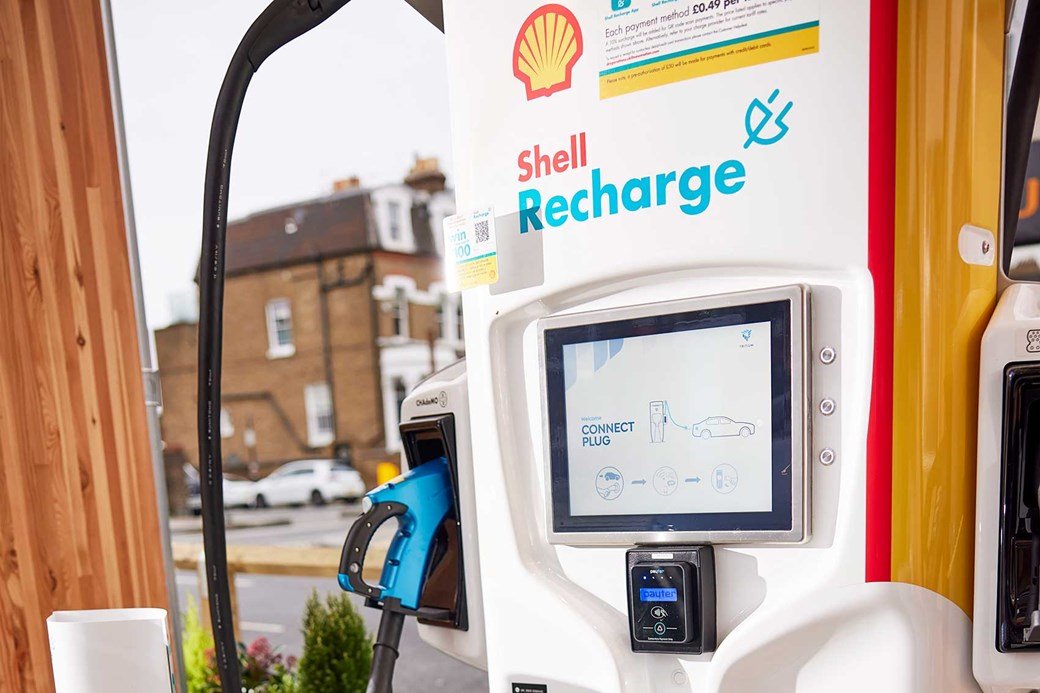
The oil majors have been preparing for this transition for years, investing in every part of the electromobility value chain, not just in EV-catering service stations, but even into EV battery manufacturing and EV subscriptions. Here's a look at their strategies and examples:
Shell
Shell is a leading player in the EV charging space, aiming to install over 500,000 chargers by 2025 - this by forming partnerships with OEMs to provide charging solutions for their customers.
Long-term, Shell has the ambition to become the world’s largest EV-charging provider and, by 2050, an energy company with net-zero emissions. To that end, the company is building a portfolio of low- and no-carbon energy products, including renewable electricity, hydrogen and biofuels, and even EV subscriptions.
Shell has acquired several EV charging companies, including NewMotion and Ubitricity, to enhance its capabilities and expand its charging network, particularly in urban areas.
But Shell is also expanding their own public charging network along major highways, at their own fuel stations, but also at supermarkets and business premises.
With its Shell Recharge card, it currently offers access to more than 70,000 of its own public charging networks in Europe, North America and elsewhere, as well as to more than 300,000 charging points of affiliated networks.
BP
BP is investing heavily in EV charging infrastructure. They aim to increase their global charging points to 100,000 by 2030, with a strong focus on fast and ultra-fast chargers.
In 2018, to accelerate their expansion in this sector, they acquired Chargemaster, a leading UK EV charging company - now rebranded BP Pulse, with close to 35,000 charge points around the world.
The company also has its own assorted investments and interests up and down the EV value chain.
TotalEnergies
The French major is actively expanding its EV charging network, with a focus on urban and highway locations. They are also investing in battery storage and renewable energy projects to support the growing demand for electricity.
Additionally, TotalEnergies has won the 10-year concession by the City of Paris to manage and expand its public EV charging network. This involves modernizing existing infrastructure and increasing the number of charge points by 56% to 2,300.
Others
Eni, prominent in Italy, is pursuing a multi-pronged approach, investing in EV charging infrastructure, renewable energy, and biofuels. They are expanding their network of fast chargers across Europe.
Spain-based Repsol and PKN Orlen from Poland are also expanding their EV charging networks and exploring other avenues for decarbonization.
Chevron and ExxonMobil have been slower to embrace the EV transition. However, they are starting to invest in renewable energy and low-carbon technologies.
Key transformation
While the speed and scope of the transition varies, it’s clear that all major fuel retailers have recognised the need to adapt to the growing trend towards EVs and the declining demand for fossil fuels. They are establishing themselves as major players along the entire electromobility value chain.
Key to their transition, however, will be the transformation of the service station. Recharging is not the same as refueling, so apart from replacing fuel pumps with charging stations, the philosophy of the locations will have to change.
As most drivers will stay longer on site while their vehicle charges, more attention will go to expand and diversify food and beverage services, with convenience stores joined by cafés and restaurants. Vehicle-related services will expand, with car washes, tire checks and other options becoming standard.
While the number of service stations is likely to further decline in the coming years, those that are left will be transformed to something like that new TotalEnergies location near Paris: a place with more convenience and comfort than most of today’s petrol stations. As you charge your EV, you will need to stay longer – but you’ll also want to stay longer…